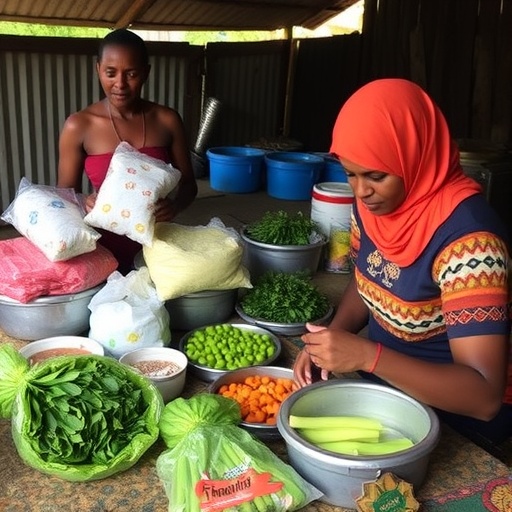
In many low-income rural communities across the world, the transition from traditional biomass fuels to cleaner cooking alternatives remains an arduous challenge. Despite the well-documented health and environmental advantages of clean fuels such as liquefied petroleum gas (LPG), affordability and sustained access continue to obstruct widespread adoption. A recent pioneering study conducted in Tanzania delves deeply into this problem, unearthing complex financial and social dynamics that entangle efforts to promote clean cooking energy. By harnessing a rigorous randomized control trial combined with behavioral economics tools, this research paves new pathways toward understanding—and ultimately overcoming—the stubborn barriers to clean fuel uptake.
At the heart of the inquiry lies a simple question: Can easing liquidity constraints through targeted interventions empower low-income households to consistently afford clean cooking fuels? The research team deployed an innovative “lockbox” system, designed to help participants restrict expenditure of money earmarked for LPG refills. Paired with micro-saving nudges, which are behavioral prompts encouraging incremental savings, the study sought to bootstrap consistent LPG use over a full year. Roughly five hundred participants from rural Tanzanian households engaged in this stepped-wedge trial, providing a rich dataset to tease apart the nuanced effects of the intervention.
The trial’s findings paint a revealing yet sobering picture. Compared to participants who received only savings nudges, those combining nudges with the lockbox intervention increased their annual LPG refills by an average of 1.4 units. This equates to a statistically significant boost in LPG use frequency, quantified as approximately 0.054 additional refills every two weeks with a tight 95% confidence interval of 0.043 to 0.066. The strong statistical significance (p 0.0001) suggests the intervention effectively incentivized increased LPG purchase behaviors, confirming that liquidity constraints do indeed play a crucial role in impeding clean fuel affordability.
.adsslot_t8RCoDuwFM{width:728px !important;height:90px !important;}
@media(max-width:1199px){ .adsslot_t8RCoDuwFM{width:468px !important;height:60px !important;}
}
@media(max-width:767px){ .adsslot_t8RCoDuwFM{width:320px !important;height:50px !important;}
}
ADVERTISEMENT
However, the magnitude of improvement unveils an important caveat. While the intervention nudged refills upward, the increase was modest and insufficient to drive exclusive reliance on LPG for cooking. Participants’ firewood consumption decreased only slightly, underscoring the persistence of traditional fuel use even under improved financial access to LPG. Furthermore, the intervention did not significantly affect the timing gaps between LPG refills nor alter the frequency of charcoal use, signaling that more complex socio-economic factors mediate fuel choice beyond mere liquidity.
Digging deeper, the study illuminates the gendered financial realities intimately linked with fuel procurement decisions. In many households observed, women bear sole responsibility for LPG expenses but must simultaneously juggle competing domestic demands—a balancing act influenced by entrenched social expectations and economic pressures. This dynamic often compels women to ration LPG purchases, even when liquidity constraints are relaxed through interventions like the lockbox. Such gendered decision-making frameworks ultimately limit the extent to which financial tools alone can shift cooking fuel behaviors toward cleaner, healthier options.
This intersection of financial, social, and gender factors profoundly shapes the energy transition trajectory in low-income settings. Clean energy policies that focus singularly on monetary subsidies or easing cash-flow barriers may neglect these nuanced determinants, thereby falling short of enabling full clean fuel adoption. The study compellingly argues for holistic policy designs that meaningfully incorporate gender norms, household economic structures, and social pressures. Only by acknowledging and addressing these layers can clean cooking solutions achieve sustainable scale and impact.
From a methodological standpoint, the use of a stepped-wedge randomized control trial design bolsters the credibility and rigor of the findings. This approach systematically phases the intervention rollout across clusters, allowing all participants to eventually receive the benefits while permitting temporal comparisons. Such a design is particularly suited for assessing interventions where withholding benefits indefinitely may be ethically challenging. In this context, it enabled the disentanglement of intervention impacts from temporal trends and unobserved confounders inherent in a dynamic rural environment.
Moreover, the integration of behavioral micro-saving nudges alongside a physical lockbox highlights the potency of combining financial technology tools with behavioral insights. Micro-saving nudges draw from a rapidly expanding field in behavioral economics, where small, consistent prompts can significantly influence financial behaviors in low-income populations. The lockbox, functioning as a commitment device, operationalizes the nudge by physically constraining access to LPG funds and thus guarding against impulsive spending. Such hybrid interventions embody the forefront of experimental strategies seeking to enhance energy access via socio-financial innovation.
Yet, the mixed success evidenced by the trial also underscores the limitations of demand-side interventions when facing structural supply-side and socio-cultural challenges. While making LPG more affordable and easier to save for is a vital step, it must be coupled with efforts addressing fuel availability, distribution infrastructure, and community norms around cooking practices. For example, if LPG supply is sporadic or costly due to distribution inefficiencies, improved household liquidity may have limited impact. Similarly, cultural attachments to firewood or charcoal for flavor or cooking style may persist unless alternative fuels are positioned to meet these preferences.
Importantly, this Tanzanian case study extends its relevance globally by illuminating universal challenges faced by many developing country settings. The dual hurdle of financial affordability and gendered intra-household dynamics is echoed across sub-Saharan Africa, South Asia, and beyond. Policymakers aiming to deliver the benefits of clean cooking must heed these lessons to design multidimensional interventions rather than purely economic ones. Social norms, gender equity, supply chains, and financial instruments must all be integrated into cohesive strategies.
The trial’s year-long duration also provides a valuable temporal lens on behavior change processes. While short-term trials may capture initial adoption spikes, longer studies reveal how persistent usage ebbs and flows amidst fluctuating incomes, seasonal needs, and social pressures. This temporal insight reinforces that sustainable clean fuel adoption requires continuous support and adaptation rather than one-off subsidies or nudges.
In the broader context of global energy transitions, clean cooking remains a critical yet often overlooked piece of the puzzle. Household air pollution from biomass fuels causes millions of premature deaths annually and contributes substantially to climate change through black carbon emissions. Unlocking the potential for affordable, sustained use of LPG and other clean fuels has far-reaching implications for public health, climate mitigation, and socio-economic development. This study’s nuanced contributions help refine the path forward for targeted interventions aligned with the lived realities of low-income consumers.
Technological innovation also plays a complementary role. While this trial focused on behavioral and financial tools, advances in low-cost LPG stove design, smart metering, and mobile payment systems offer promising avenues for future research and policy. Integrating such technologies may further empower consumers to manage costs, usage, and fuel procurement more effectively, addressing barriers beyond liquidity constraints. Cross-disciplinary studies blending technologic, behavioral, and gender perspectives will be instrumental in maximizing clean cooking uptake.
In conclusion, this groundbreaking randomized trial in rural Tanzania lays bare the multifaceted nature of LPG affordability challenges. By demonstrating modest gains through lockbox and nudges but highlighting persistent firewood use and gendered rationing, the research cautions against simplistic assumptions that financing solutions alone suffice. The findings advocate for holistic, gender-sensitive clean cooking policies that transcend liquidity improvements, embracing social, cultural, and infrastructural domains. As global momentum builds toward clean energy goals, such rigorous field evidence provides crucial guidance for equitable and effective energy transitions.
Subject of Research: Affordability and usage dynamics of liquefied petroleum gas (LPG) for clean cooking among low-income households in rural Tanzania, with a focus on financial and gendered barriers affecting fuel adoption.
Article Title: Deconstructing the (un)affordability of clean cooking fuels through a randomized trial in rural Tanzania.
Article References:
Gill-Wiehl, A., Ray, I., Katikiro, R. et al. Deconstructing the (un)affordability of clean cooking fuels through a randomized trial in rural Tanzania. Nat Energy (2025). https://doi.org/10.1038/s41560-025-01778-w
Image Credits: AI Generated
Tags: barriers to clean fuel adoptionbehavioral economics in energy accessclean cooking energy solutionshealth benefits of clean cooking alternativesinnovative interventions for clean cookinginsights on clean energy transitionliquidity constraints and cooking fuelslow-income household energy challengesLPG affordability in rural communitiesmicro-saving strategies for clean cookingrandomized control trial in TanzaniaTanzania clean cooking trial



